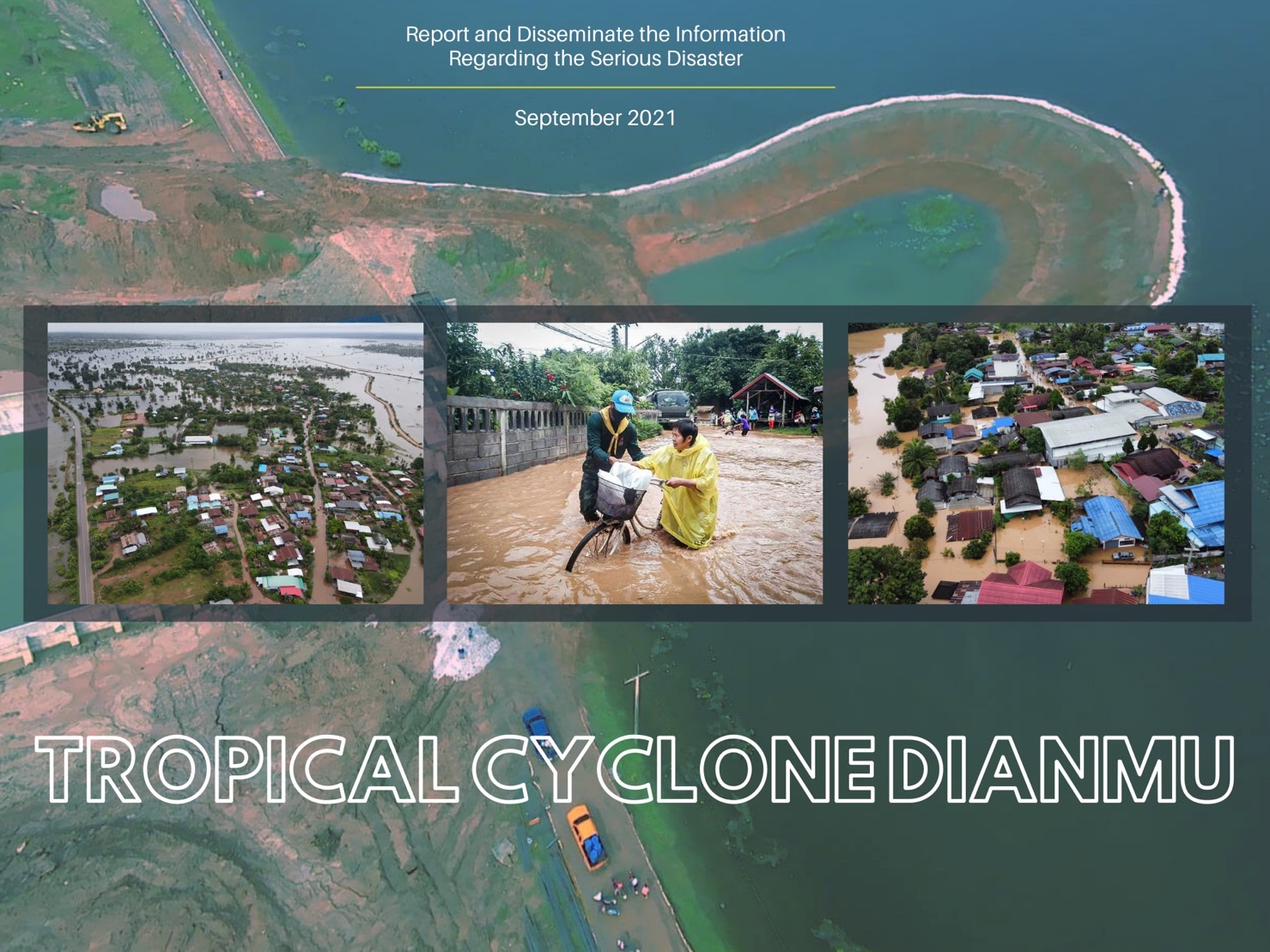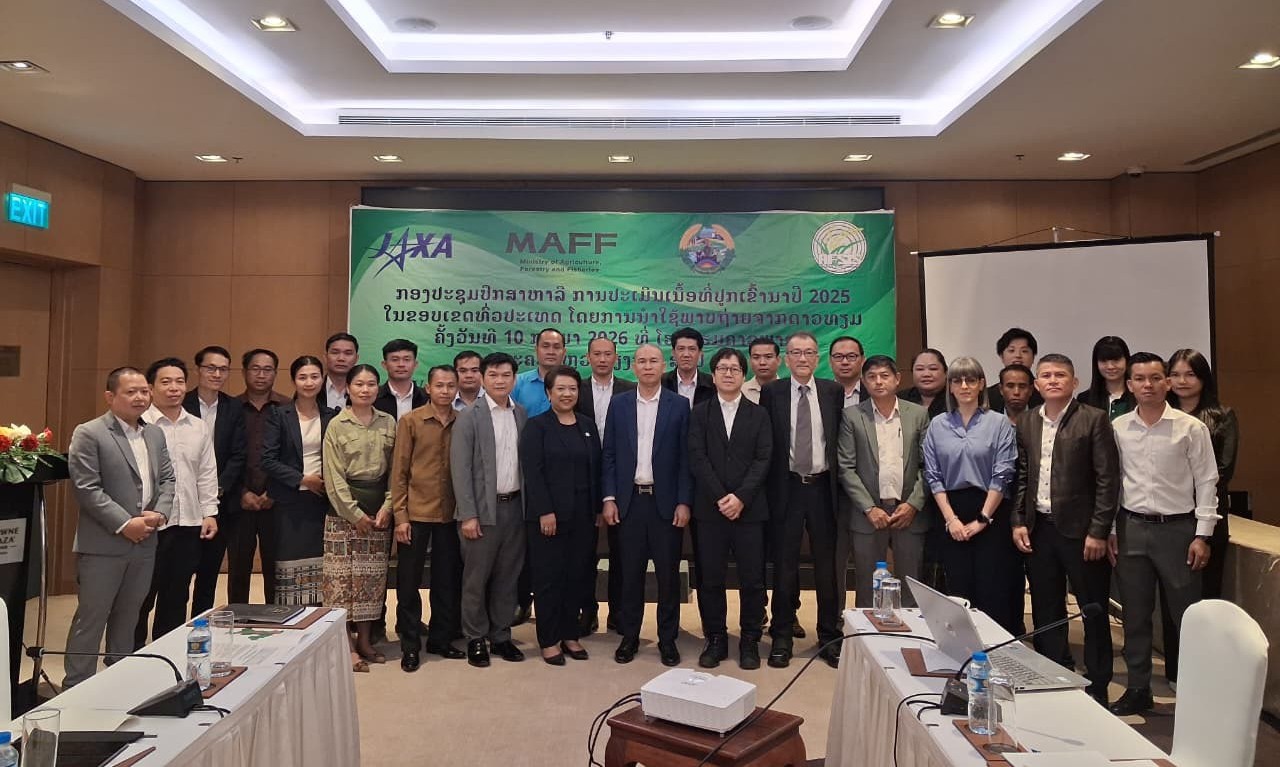
.png)
Report and Disseminate the Information Regarding
the Serious Disaster
TROPICAL CYCLONE DIANMU
September 2021
Source: Disaster Monitoring and Response System (DMRS); Pacific Disaster Center (PDC Global); Department of Disaster Prevention and Mitigation (DDPM), Thailand; Geo-Informatics and Space Technology Development Agency (GISTDA), Thailand; Lao PDR’s National Disaster Management Organization (NDMO);Steering Committees for Disaster Prevention and Control of the localities; Vietnam National Disaster Management Authority (VNDMA)
Tropical Cyclone DIANMU which is originated from the South China Sea has moved to the Northwestern and Central areas of Vietnam on 23 September 2021. According to the Steering Committees for Disaster Prevention and Control of the localitiesand VNDMA as of 25 September 2021, Tropical Cyclone DIANMU created damages and affected up to 2,845 familiesor 14,225 persons with missing 3 people, and injured 3 people. Moreover, this Tropical Cyclone has damaged 2,607 houses and partially damaged 118 houses. Also, there were 201 damaged roads, 5 damaged schools, and the agricultural land damaged of 3,734 hectares consisting of the rice field for 849 hectares, other crops for 2,525 hectares,and livestock lost around 5,402 animals. Nevertheless, the Vietnamese government came out with the supporting policies for all related agencies to proactively collect information, follow up, and monitor closely to this disaster situation and its effects in order to prepare to remedy the damaged roads and buildings as wellas take parts in searching the missing persons and relocating the victims to the safer places.
Afterward, the Tropical Cyclone DIANMU moved to the Southern part of Lao PDR. Occurring as reported from Lao PDR’s National Disaster Management Organization (NDMO), the Tropical Cyclone DIANMU has gotten weaker and become Tropical Depression which also affected many provinces in the South of Lao PDR. In any case, the NDMO, is still in the progress of collecting and reporting the follow-ups of the situation in the affected areas.

The background image is from NASA.
On 24 September 2021, the effects of Tropical Cyclone DIANMU which has gotten weaker and become Tropical Depression moved over Northeastern and Central areas of Thailand causing Thai upper regions to have heavy to very heavy rainfall from 23 September 2021 to 29 September 2021. In the result of the heavy rainfall, flash floods occurred in provinces as follows: Chiang Mai, Lamphun, Lampang, Tak, Sukhothai, Phitsanulok, Phetchabun, Phichit, Kamphaeng Phet, Loei, Khon Kaen, Chaiyaphum, Yasothon, Nakhon Ratchasima, Buriram, Surin, Ubon Ratchathani, Prachin Buri, Sa Kaeo, Chanthaburi, Nakhon Sawan, Uthai Thani, Chainat, Lopburi, Suphan Buri, Sing Buri, Ang Thong, Phra Nakhon Si Ayutthaya, and Nakhon Pathom.There were 197,795 affected households together with 7 deaths and 1 missing person (DDPM).
Referring to Geo-Informatics and Space Technology Development Agency (GISTDA) on 28 September 2021, it has been reported with total flood areas of 95,221.28 hectares in the Northern and Central parts of Thailand. The total flood areas consist of provinces as follows: Sukhothai 35,588.96 hectares, Nakhon Sawan 22,319.68 hectares, Phichit 20,526.4 hectares, Phitsanulok 11,905.6 hectares, Kamphaeng Phet 4,113.76 hectares, Uttaradit 434.72 hectares, Uthai Thani 190.88 hectares, Phetchabun 110.88 hectares, and Tak 30.40 hectares. Most of the affected areas are the agricultural areas, lowland areas, and riverbank areas. Since the floods in these areas flow into the lower land of Chaiyaphum province, it causes massive impact in the region, especially on the rice planted areas in Chaiyaphum’s districts such as Mueang Chaiyaphum, Ban Khwao, and Bamnet Narong. Also, it is forecasted that the rice paddy will be affected for around 25,600 hectares while most of the rice is in the flowering and harvesting stages. Thus, the Thai government conducts the field visitto the severe flood-prone provinces such as Sukhothai and Chaiyaphum in order to rescue and aid the affected citizen, prepare the relevant authorities to install barriers and pumps, and proceed with the assessment and close monitoring to this certain disaster.
Download word file click here --> TROPICAL CYCLONE DIANMU

On 12-13 February 2026, the AFSIS Secretariat, in collaboration with the Japan Aerospace Exploration Agency (JAXA), the Remote Sensing Technology Center of Japan (RESTEC), Ministry of Agriculture, Forestry and Fisheries (MAFF) Japan and the Office of Agricultural Economics (OAE), Ministry of Agriculture Cooperatives (MOAC), conducted a workshop conducted a workshop The Promoting Rice Planted Area and Production Estimation Using INAHOR and Space-based Technologies in Thailand at the Meeting Room 2, Innovation Building, 3rd FL, Office of Agricultural Economics (OAE)

The In-Country Workshop on Promoting Rice Planted Area and Production Estimation Using Space-based Technologies in Lao PDR was jointly organized by AFSIS Secretariat, JAXA, MAFF Japan, and MAE Lao PDR under the AFSIS-GIS and SAFE projects. The event was held in Vientiane with hands-on training on 9 February 2026 and a workshop on 10 February 2026.
.jpg)
On 13–15 January 2026, the Office of Agricultural Economics (OAE), Thailand, in collaboration with the Ministry of Agriculture, Forestry and Fisheries (MAFF), Japan, and the AFSIS Secretariat, conducted the 1st Meeting of Japan–Thailand Expert Dialogue on Agricultural Statistics. The meeting was held at the Office of Agricultural Economics and field survey activities in Chonburi Province.

On 3–4 December 2025, the ASEAN Food Security Information System (AFSIS) Secretariat participated in the ASEAN Plus Three Emergency Rice Reserve (APTERR) Table Top Exercise (TTX) held in Bandar Seri Begawan, Brunei Darussalam.